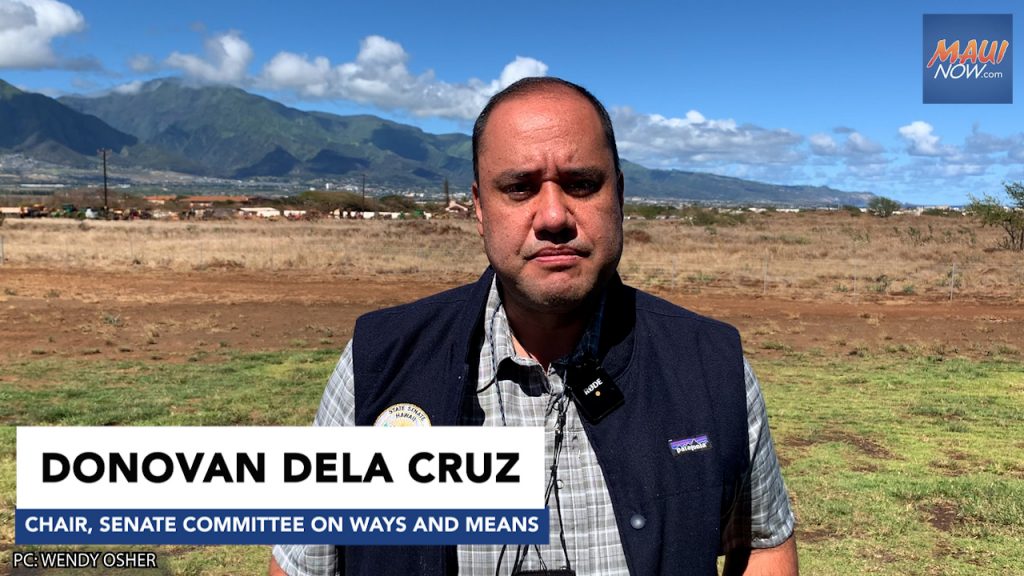Hawai‘i Senators Visit Mahi Pono on Maui, Explore Strategies to Stabilize Economy

The Senate Committee on Ways and Means conducted a site visit today of Mahi Pono’s farming operations in Central Maui.
“There is a lot of potential for economic diversity here on Maui, especially with agriculture and value added products,” said Donovan Dela Cruz, Chair of the Senate Committee on Ways and Means. “We’re going to have to come up with a strategic plan on how we develop our education system so that we can create a skilled workforce, specifically for agriculture pipelines and value added pipelines.”
“We’re also going to have to work to determine what kind of facilities would best help those who are in the fight now to make sure that ag is going to be successful and value added. They may be cold storage; they may be warehouses; they may be processing equipment–and we’re just going to have to strategize and map all of this out… so that we can stabilize our economy for the long run.”
The WAM committee spent three days on Maui with visits that included: the Maui Food Technology Center; the Maui High Performance Computing Center and Pacific Disaster Center in Kihei; Wai’ānapanapa State Park, Hāna High and Elementary School and Hāna Ranch in East Maui; the Wailuku Civic Center, Mahi Pono and the University of Hawaiʻi Maui College in Central Maui. Members also discussed strategies with the Hawaiʻi Tourism Authority.
The purpose of these visits were to identify issues and potential solutions to address economic development, and leverage critical private partnerships to decrease State resource dependence and liability.
Maui Mayor Michael Victorino said, “I’m thankful that the Senate Ways and Means Committee has spent some time here in Maui County to see and understand what we’re trying to accomplish here. It’s nice to see a big company like Mahi Pono and spending time with them, but we have a lot of smaller farms that next time we hope to get them to visit, so that they get a better understanding.”
“They went out to Hāna yesterday and saw what the Hāna farmers… need to continue to develop farming out in the East end. Here… we are really moving ahead, but many of the products are going to take a few years–like lime trees, lemon trees. While we’re doing that, they are looking at other crops that can be more immediate like potatoes and onions and others that we can eat right here,” said Mayor Victorino.
“We’re working with a lot of partners on what the best crops to grow are on the land that we have at Mahi Pono,” said Darren Strand, VP of Agricultural Outreach at Mahi Pono. “It’s 41,000 acres old sugar lands, and it’s been in sugar for 150 years. And we have a lot to learn about what we can grow in certain soils, and certain climates, and certain places on our farms.”

“It’s pretty awesome. This is probably one of the largest farms in Hawaiʻi–41,000 acres–that’s a lot of land, and a lot of opportunity,” said Dela Cruz.
ARTICLE CONTINUES BELOW AD“They’ve already started with quite a bit. They’re working on import replacement. Right now they have a couple hundred employees. Once this is all fully build out, [they’ll have] over 700. And the compounding effect because of the ag–[we’ll have] more value added producers, [and] a possibility for not just feeding our own, but exporting. We’re really going to be able to put Hawaiʻi on the map–we once had sugar and pineapple, but in a much more sustainable way.”

Strand said that after completing a third year, Mahi Pono has learned how to develop its acres. “We’ve become really good at transitioning from a bare field that was sugar, upgrading the irrigation system, getting the soil ready, and planting the trees. When we first started, I think all of us were amazed at how difficult that project would be, and now we’re able to convert acres in a few days to a few weeks and have trees planted.”
“Now we’re transitioning into–what’s the best way to grow the trees, and really building that knowledge base on Maui or what we need to do to grow healthy, high producing citrus trees,” said Strand.






_1768613517521.webp)

